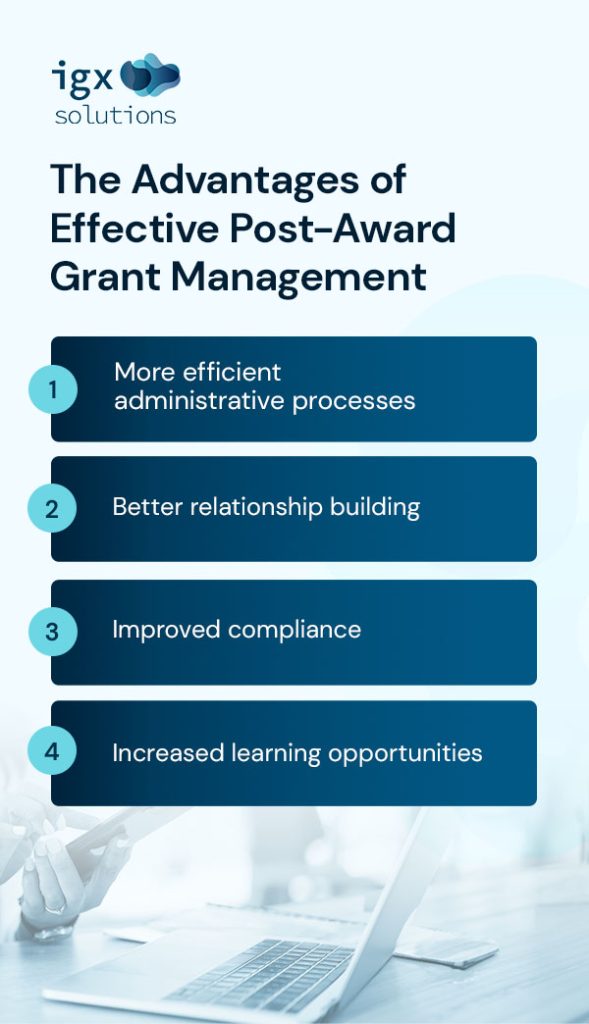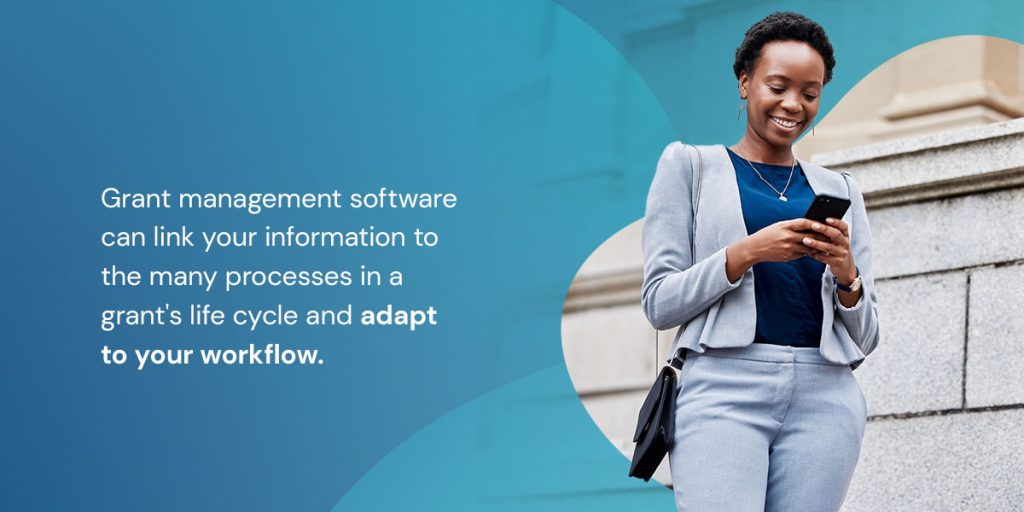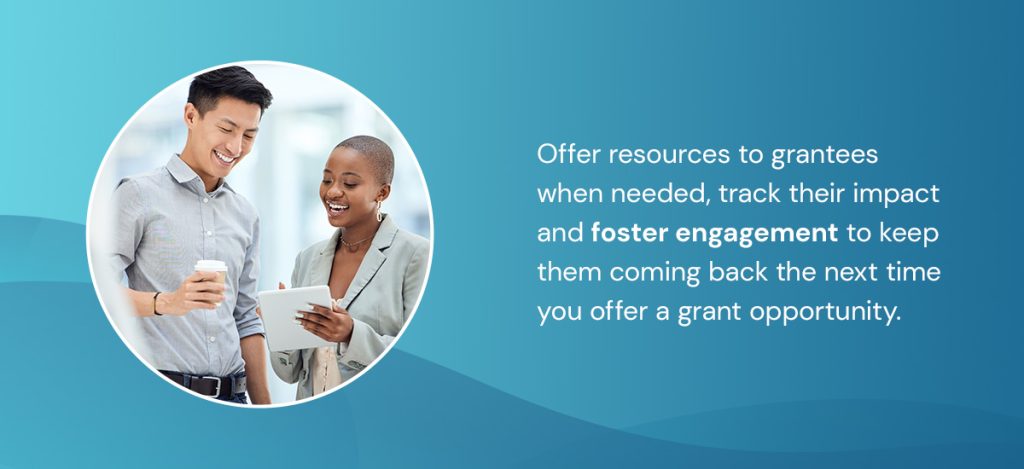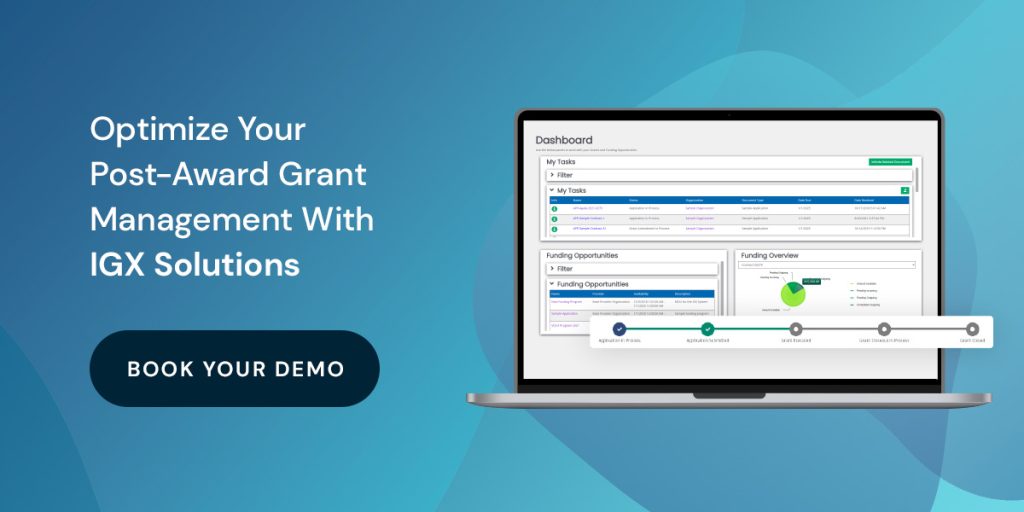
Table of Contents
You’ve made the tough decisions and chosen who will receive your grant program’s funding — but, as a grantmaker, your job isn’t done. The post-award phase of a grant program involves significant data management as you collect information from grantees, learn from it, and report on it for regulatory compliance.
Navigating these tasks effectively can help you streamline your processes, learn from the program’s results and avoid regulatory problems. With a thoughtful plan and the right tools, you can optimize your grant management workflow and boost the value of your program.
Before exploring how to manage post-award grants, you and your team should understand the responsibilities in this phase. In post-award grant management, grantmakers often have a long list of smaller elements to tackle, including:
Grants involve a lot of paperwork from start to finish, and your post-award management team needs to keep track of all of it. That’s why we recommend using a grant management platform that helps you centralize information and be ready to provide it at a moment’s notice.
You went through the effort of developing the grant. Now, in the post-award phase, you’ll want to ensure it’s being treated as intended. Checking in with recipients regularly helps you keep an eye on your resources and make sure everything is going according to plan.
Keeping your funds organized is yet another area where post-grant awards management software is beneficial, as you can see all your finances in one place.
You want everyone on the same page during post-award grant management. Maintaining communication throughout the grant’s duration will help all parties know how far they’ve come and how much they still have to do to meet the grant’s stipulations.
As grant agreements change and evolve, you’ll be tasked with updating agreements and analyzing the terms so your grant stays a win-win situation.
As data starts to roll in, part of the post-award grant management process is documenting these findings and presenting them in valuable ways. While it may take time for the data to prove or disprove any hypotheses, tracking it from the start will be immensely helpful later on in the process.
The methods for accomplishing these tasks can vary widely, but they almost always require significant data management, so some of the biggest problems in the post-award stage involve technology. Communication and organization are also important throughout the process. Ensuring the smooth flow of information depends on minimizing data entry requirements and automating tasks wherever possible, such as generating reports and logging activities for audits.
As you work toward building or updating your post-award processes, consider how you currently approach the tasks in this list. Identify any bottlenecks or other problem areas you want to address and keep them in mind.
When you learn how to manage and implement post-award grant management best practices well, you can reap benefits that range from reduced overhead to better risk management. Many solutions can also offer advantages in the other stages of grant management. For example, a correspondence tool can help you coordinate progress reports with your grantees — it might also facilitate a positive applicant experience by allowing you to answer questions and offer better support for the application.
Some of the most prominent benefits of effective post-award grant management include:
Streamlining your workflows can dramatically reduce the time your team must spend managing grants, leaving more room to focus on supporting your cause. Consider revisiting your grant management techniques if you have extensive labor demands eating into your budget.
Stronger award management can improve communication with grantees, strengthening relationships and encouraging them to apply for other opportunities. Positive experiences and results can also help you boost your reputation as a valuable partner and an impactful organization.
Errors or forgotten deadlines impact your compliance with regulators. By organizing your post-award approach, you can avoid these problems and reduce their associated risks, like missed grant opportunities or fines.
With effective reporting, you can learn more about the success of your program and find areas for improvement.

These are just a few examples of how your post award grant management strategy can help.
The post-award grant process requires thorough planning and organization. Use these strategies to guide your approach to grant management and maximize the value of each element.
Receiving a grant award is exciting news, but your grantees will want to know what it means for their workloads, especially if they have small teams or limited budgets. Staff-related issues comprise the biggest challenge for nonprofit leaders, with one leader emphasizing the adverse effects of difficult funder practices.
Carefully consider how much your requirements affect your recipients’ workload. Once developed, lay out the steps in plain language to avoid any confusion. Unclear guidelines can lead to more problems later and may create additional work for your team as they fix problems and answer questions.
List all requirements and deadlines clearly, ideally with an easy-to-reference to-do list or a calendar with deadlines.
After choosing your recipients, you may have several pressing tasks to accomplish in a short time, including:
In many cases, grantees cannot start work until you disburse the funds, so a quick turnaround is ideal. The more you can automate, the easier it is to speed up this workflow. Focus on finding technology solutions that streamline your processes and provide an intuitive experience for your staff and grantees. Guide grantees through each step and offer confirmation where appropriate, such as after signing an agreement.
By making the process more intuitive and offering self-service tools, like uploading documentation directly to your database, you prevent your staff from playing middleman. Recipients get 24/7 access and may need to ask fewer questions.
Once you reach the reporting phases, try to minimize the time grantees must spend meeting your requirements. Every hour they spend compiling reports and answering questions is an hour they can’t spend working toward your shared goal. Help them focus on what’s important by streamlining your requirements where possible, such as reducing questions to only the necessities and providing easy submission tools.
If you want to streamline, you’ll also need good organization. Post-award processes are data-intensive, with varied potential formats, like spreadsheets, documents, images and videos. Many organizations start grant programs by making phone calls, sending emails and manually copying information into another system, such as a spreadsheet.
Switching to post award grant management software adds centralization. Instead of trying to connect information from various sources and devices, your data goes straight to the cloud-based grant management platform.
You can keep correspondence, progress reports, receipts and many other details in one place. All team members have access to the same data, and you greatly reduce the chances of working from duplicated or out-of-date information. Inaccurate or unnecessary data can add complexity, increase labor requirements and create delays, but centralization goes a long way in preventing these effects.
You’ll find many cloud document storage solutions, but look for a system that matches the unique demands of the grant process. Grant management software can link your information to the many processes in a grant’s life cycle and adapt to your workflow. Software has helped grantors in many fields, including state and local government, achieve digital transformation.

Any organization collecting data must consider its security. Grantmakers typically need to meet compliance requirements from governments and industry organizations.
Centralization is a key element of security and compliance, along with other features like:
Audit logs keep detailed records of every activity in your grant management platform. They can tell you who does what and when — all while preventing modification. Many regulators require audit logs to assess data integrity, but they can also help internally if you need to investigate issues. Grant management programs can automatically track activities for easy access during an audit.
Submitting on-time reports is essential for meeting requirements and maintaining positive relationships with regulators. Meet these demands easily with simple report generation and reminders to keep you on track with deadlines.
Granular user-level permissions allow you to choose who can access what data, only granting access to the most sensitive data to the people who truly need it. Look for a solution with user permissions, especially if you work with sensitive details such as personal health information.
Another valuable security best practice to consider is MFA, which requires users to confirm their identities using two forms of authentication. For example, a team member might enter a password and a code sent to their email account.
Similarly, your system should provide appropriate security according to accepted standards. For instance, the System and Organization Controls framework assesses a company’s security controls in key areas. Adherence to standards like these can help keep your grantees’ information safe.
Depending on your field, your organization may also need to meet industry-specific guidelines, like the Health Insurance Portability and Accountability Act in health care grant management. Your grant management software may not need to be compliant itself, but it should help you meet compliance requirements with appropriate security and reporting features.
Compliance relies on high data integrity, so a program that boosts accuracy can help you avoid regulatory hiccups. Integrations can limit errors from manual data entry, and verification processes offer additional checks. You can also set rules to prevent issues, such as only allowing a submission if the user fills out all required fields.
Working with multiple grants or grantees can quickly become complex, so you must keep them organized to prevent demands from falling through the cracks. Say you have multiple team members keeping track of progress through phone calls and texts on personal devices. What happens when one of these team members leaves the company or goes on vacation?
Centralizing correspondence into one place helps everyone stay on the same page. Your staff can access historical conversations to build context, and you gain reliable records where multiple team members can jump in to assist. You can also use tools like templates and distribution lists to engage with multiple grantees quickly.
Post-award grant management software can also help you monitor your relationship with different grantees. Offer resources when needed, track their impact and foster engagement to keep them coming back the next time you offer a grant opportunity.

During grant management, you’ll collect plenty of data. Make the most of this information by analyzing and reporting on it. Reporting is your opportunity to learn more about your program and add value for grantees and stakeholders.
Consider what metrics are most important to different parties and how you can track them. Some topics to consider include:
Explore how many grants you award, which categories they fall under and how much money you disburse.
Gain insights into how your grantees use the funds, including information on beneficiaries and initiatives created.
If you’ve offered your grant multiple times, compare your latest results with historical ones. A growing impact might demonstrate improvements in your selection process that attest to your hard work.
Evaluate your DEI efforts, such as the demographics of recipients or beneficiaries.
You have many options for measuring your performance, and a robust grant reporting tool simplifies the process. Access data on an overarching dashboard, or drill down to individual recipients. From importing information from your database to visualizing and sharing results, your approach to reporting is a great way to learn more about your program and use the post-award phase or continual improvement.
Also, make sure your reports get to the right people. Internal reporting is essential for making positive changes, but you can also share data with applicants, stakeholders and the general public. Reporting transparency can build trust with the public and help applicants understand if they’re a good fit for your program. Stakeholders also appreciate easy access to monitoring efforts.
Staying on the same page is essential for any grant management team, from the grants coordinator to leadership representatives to accountants. Putting your data in one place and improving communication can set your team up for collaborative success. When communication comes easily, staff can work together to improve efficiency and solve problems creatively.
You can also support communication by improving visibility. Consider adding notifications to speed up workflows, such as alerts when a document needs approval or reminders when a deadline approaches.
Accessibility is another must-have. Many people on grant management teams — within your organization and those of your award recipients — have different abilities. An accessible solution offers a much more inclusive process for these individuals, which can improve their experience, speed and accuracy while helping you comply with the Americans with Disabilities Act. Government organizations may have other requirements, such as Section 508, which requires information and communication technology to be accessible to differently-abled people.
Ideally, your post-award grant management software exceeds industry standards like the Web Content Accessibility Guidelines. As the post-award phase requires more interaction between your organization and the grantee, an accessible solution can help grantees see you as a partner who’s easy to work with and come back the next time you offer a program. From an employer’s perspective, usability standards can also help you hire and retain diverse, qualified team members and offer an engaging work environment.

For grantmakers, post-award grant management is a crucial component of the overall program, supporting its success and your organization’s mission. Today’s data-heavy processes call for capable technology, and the right software helps you offer more effective grant programs with greater efficiency. At IGX Solutions, we designed IntelliGrants® IGX to meet the needs of grantmakers and provide flexibility for unique workflows.
IntelliGrants IGX’s personalizable, intuitive platform is packed with resources and tools for every stage of grant management. Centralize your data on award recipients, turn your information into actionable insights and organize your documents, correspondence and compliance requirements. Book your demo today to see how IntelliGrants IGX can streamline your post-award grant management.